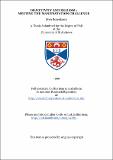Files in this item
Objectivity and realism : meeting the manifestation challenge
Item metadata
| dc.contributor.author | Rosenkranz, Sven | |
| dc.coverage.spatial | xxii, 224 p. | en_US |
| dc.date.accessioned | 2018-06-28T09:05:01Z | |
| dc.date.available | 2018-06-28T09:05:01Z | |
| dc.date.issued | 1999-08 | |
| dc.identifier.uri | https://hdl.handle.net/10023/14685 | |
| dc.description.abstract | The anti-realist maintains that all thoughts that we may entertain are thoughts whose truth-values we can in principle come to recognise. The realist refuses to make any such claim about the limits of our thinking. The anti-realist purports to arrive at her position on the basis of considerations which relate to the manifestability of understanding, i.e. the idea that grasp of thoughts must be manifested in linguistic abilities. Thus she argues against the realist that this requirement cannot be met unless truth is understood not to extend beyond what we can know. Turning the tables, I argue that it is the antirealist who cannot vindicate her position on these grounds. Some thoughts are apt for objective truth; their truth cannot be equated with their current assertibility. Our grasp of such thoughts is not yet manifested in our ability to assert or deny sentences. Once we have identified patterns of linguistic usage which display our grasp of such thoughts however, it transpires that there is no reason either to believe that their truth-values can in principle be recognised. | en_US |
| dc.language.iso | en | en_US |
| dc.publisher | University of St Andrews | |
| dc.subject.lcc | B835.O3R7 | |
| dc.subject.lcsh | Objectivity | en |
| dc.subject.lcsh | Realism--Philosophy | en |
| dc.title | Objectivity and realism : meeting the manifestation challenge | en_US |
| dc.type | Thesis | en_US |
| dc.contributor.sponsor | German National Scholarship Foundation | en_US |
| dc.contributor.sponsor | Deutscher Akademischer Austauschdienst (DAAD) | en_US |
| dc.type.qualificationlevel | Doctoral | en_US |
| dc.type.qualificationname | PhD Doctor of Philosophy | en_US |
| dc.publisher.institution | The University of St Andrews | en_US |
This item appears in the following Collection(s)
Items in the St Andrews Research Repository are protected by copyright, with all rights reserved, unless otherwise indicated.

